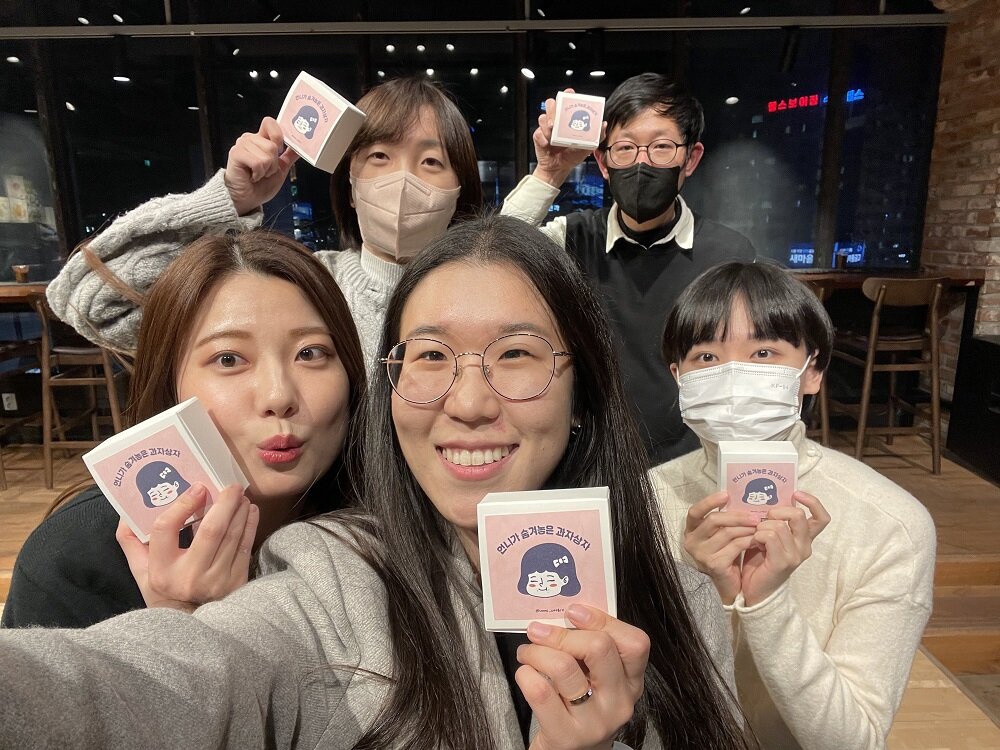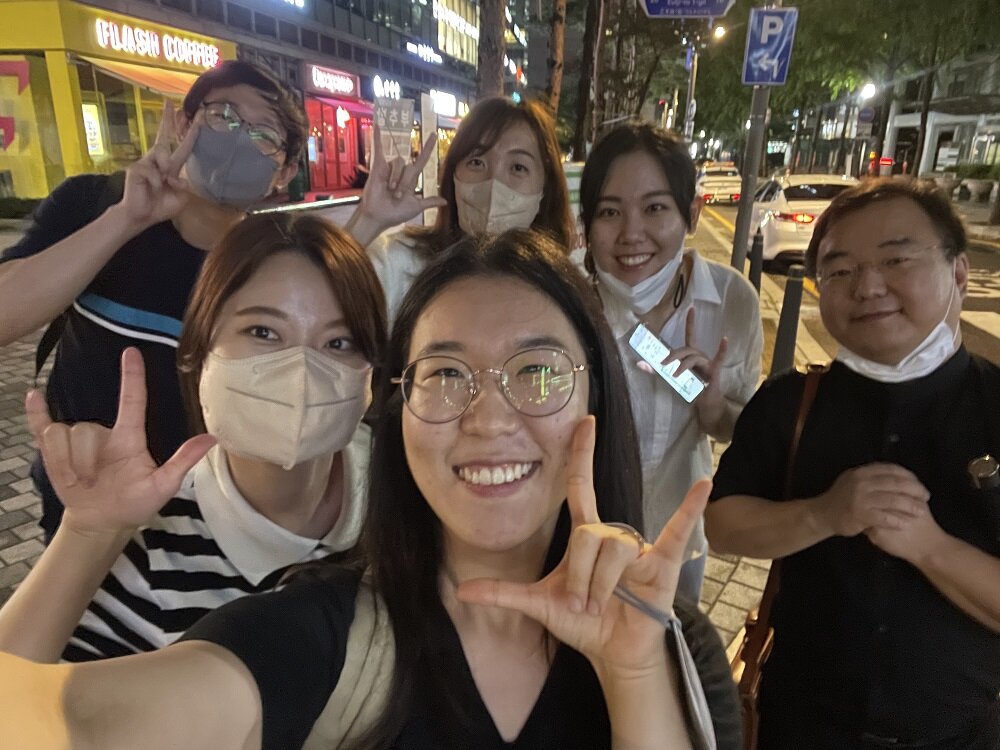By Dinora | Intern
Hello,
This is Dinora from Peace Winds Korea. I would like to share with you the next story of Deafnuri team members:)
It is widely acknowledged that access to information is a fundamental right that enables individuals to make informed decisions and participate fully in society. Unfortunately, members of the deaf community often face significant barriers to accessing information, which can cause inconvenience and limit opportunities for learning.
This issue highlights the critical need for improved accessibility measures to ensure that all individuals have equal access to information. By addressing this issue, we can promote greater inclusion and diversity in our society, and empower individuals to reach their full potential.
Interview Topic - "The Importance of Having Access to All Kinds of Information"
Question 1. Can you describe the case in which you felt that the right to access information was restricted despite the good quality of the Internet in Korea?
Answer 1. Representative of Deafnuri A:
The UN CRPD clearly states that "an environment must be prepared in which all persons with disabilities can study without discrimination on an equal basis with persons without disabilities." However, many deaf individuals still face discrimination when it comes to accessing equal and inclusive quality education and lifelong learning opportunities.
Personally, I have a keen interest in studying foreign languages, and I have searched for online lectures with subtitles and sign language to aid in my language learning. Unfortunately, such resources are scarce, and the few that do exist are often outdated, making it difficult to access the latest information.
I suggested to include subtitles and sign language to the online lectures I wished to listen, but the response was always the same: "We will discuss it internally and let you know the results." Years later, there has been no progress, and the lack of accessibility measures remains a significant challenge.
While Korea may be known for its enthusiasm for education, the reality is that even farmers are not able to access equal and inclusive educational opportunities, highlighting the urgent need for improved accessibility measures to ensure that all individuals can access education without discrimination.
Answer 2. Representative of Deafnuri, B
During my third year of high school, everyone had to prepare for the CSAT exam. However, I encountered a significant barrier to my studies because there were very few online lecture videos available with subtitles.
In an effort to improve accessibility for myself and others in a similar situation, I posted my suggestions on the bulletin board of the lecture platform's homepage. At first, there was no response, but I persisted and continued to make my case. Eventually, after several attempts, I received a response stating that the platform would expand subtitles to cover approximately 80% of the videos, although it was not a complete solution.
Thanks to this improvement, I was able to listen to more online lectures and have a better chance at succeeding on the exam. This experience has highlighted the importance of advocating for accessibility measures and the impact that it can have on an individual's education and success.
Answer 3. Representative A:
During the 'Barrier-Free Forum' held by the Barrier-Free Film Committee last fall, I presented some startling figures about the accessibility challenges faced by individuals with disabilities in Korea. As of 2020, the number of hearing-impaired individuals was around 308,000, almost reaching 310,000. Similarly, the number of visually impaired individuals was roughly 132,000, almost 140,000. The combined population of individuals with hearing or visual disabilities amounts to approximately 440,000.
However, only 10% of the total number of films produced in Korea are barrier-free, creating a significant obstacle for individuals with disabilities to enjoy movies and cultural offerings. This lack of accessibility means that almost 85% of people who are deaf or blind cannot enjoy movies as much as people without disabilities.
Even with the emergence of OTT platforms in Korea, I was unable to find subtitles when I attempted to watch dramas and Korean movies. This further underscores the urgent need for more robust accessibility measures to ensure that individuals with disabilities can fully enjoy cultural and entertainment opportunities.
I asked the OTT platform to add subtitles, but the responses I received were often similar. Some claimed that they had budgetary constraints or that adding subtitles would be reverse discrimination against people without disabilities. However, when Netflix arrived in Korea, they immediately included subtitles. As a result, all deaf people started using it. Now, not only deaf people but even non-disabled individuals find subtitles beneficial. As the number of Netflix users increased, domestic OTT platforms also started adding subtitles, but it was a delayed process, which was disappointing. I wanted to emphasize that digital cultural accessibility is not just a problem for people with disabilities. It is an issue that everyone should consider. However, I feel that there is still a lot lacking in this regard.
Answer 4. Team member C's answer:
I think it's fortunate that subtitles are actively being introduced to domestic OTT platforms. However, in particular, things like old Korean movies and masterpieces have not been subtitled, so accessibility to them is still declining. In the past, there were many times when I couldn't fully enjoy programs aired in Korea because there were not many closed captioning programs. I hope that subtitles will be introduced to all related programs (entertainment, current events, Korean movies, Korean dramas, etc.) as soon as possible. Not only that, but YouTube is all the rage, and it's a trend these days. Compared to before, many YouTubers attach subtitles directly, but there are still some YouTubers who upload without subtitles.
The video content looked interesting, so even if I tried to watch it, I couldn't understand what it was saying. I have to wear a hearing aid, I have to listen carefully, and even if I can understand it as if I don't know it, I have the experience of being deprived of the right to access information because my ear is not 100%. I check it using a real-time voice recognition application or turn on YouTube's auto-generated subtitles to watch it, but there are a lot of cases where it comes out in an alien language that I really can't understand. As YouTubers are a trend, I don't think they should be left in the blind spot of the digital culture of the deaf.
Question 2: What activities are you doing or planning to do to solve the restriction of the right to access information?
Answer: In terms of information access rights on the internet, I believe advanced IT technology is necessary to address this issue. Although none of our Defnuri team members have expertise in IT, one member has some experience in coding and web development. This year, we plan to develop travel conversation content (web) for the deaf who want to learn a foreign language, the hearing-impaired (who want to learn Korean sign language or learn a foreign language), and hearing people who want to learn sign language. I intend to learn IT technology professionally by doing this project.
Apart from the internet, I conducted interviews with four foreign farmers under the theme of 'North Korea seen from the perspective of foreign farmers' through the government support project of the National Institute for Unification Education last year. Based on this, I wrote a book. As Korean deaf people should also have the right to access information about books, I recorded a video of 'sign language' and inserted a QR code containing it. The book will be published in mid-March this year! If the response is positive, I may consider adding an international sign language video version later.
Also, during the 'Korea Youth Peace Economy Open Lab Project' in 2021, we had an idea to create a 'sign language travel conversation book using North and South sign language'. We updated this idea, and the second prototype was developed, but the project was stopped due to the need to purchase photo copyrights. With one new team member and one existing team member who joined Defnuri in February of this year, we started planning the work of 'North and South Sign Language Travel Conversation Book'. Unlike the existing prototype, we will present a completely new look. We aim to publish it by the end of this year! We would appreciate your support.
By Dinora | Intern
By Dinora | Intern
Project reports on GlobalGiving are posted directly to globalgiving.org by Project Leaders as they are completed, generally every 3-4 months. To protect the integrity of these documents, GlobalGiving does not alter them; therefore you may find some language or formatting issues.
If you donate to this project or have donated to this project, you can receive an email when this project posts a report. You can also subscribe for reports without donating.
Support this important cause by creating a personalized fundraising page.
Start a Fundraiser
